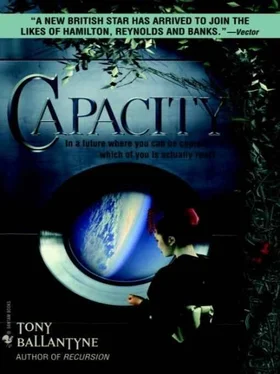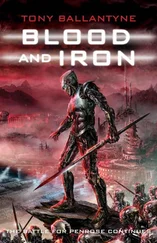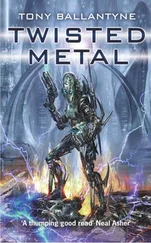He suddenly became aware that Leslie was watching him. “What?” he demanded.
“Nothing,” said the robot.
Justinian squeezed the handle of the spoon, making it frictionless for a moment. Orange sauce slipped from it to the tray. He squeezed the handle again and scooped a spoonful out of a pear half. Another Schrödinger box had appeared, lodged amid the pears themselves.
“They never did figure out what these things were doing,” he murmured to himself. “They haven’t figured out anything on this planet.” He raised his voice. “Hey Leslie,” he called, “have they even figured out how to get into the Bottle yet?”
“The Bottle?” said the robot, in surprised tones. “Why bring that up?”
“I was just thinking about all the things I will leave behind when I get off this planet. Can they get into it yet?”
“No. Do you think they really want to?” There was still an edge of sulkiness to its voice.
The ship suddenly spoke up: “Electrical storm coming up. Do you want to go around it?”
“No, straight through,” Justinian said. “And let’s have full visual.”
“No problem,” said the ship. It was nice to speak to a PC that didn’t automatically disagree with him, Justinian thought.
Viewing fields expanded all around, and the scattered flight chairs and carpeted interior of the flier gradually disappeared, leaving Justinian, the baby, and the robot seemingly hanging in empty air. There was nothing but the deep blue sea below them, the blue sky above, and, ahead of them, the sinister black line of storm clouds approaching at Mach 7.
“It’s AI five’s region,” explained the ship. “Lots of warm air rising from the ocean heat exchange.”
The black line of the storm clouds lengthened and grew, towering higher and higher above them, and Justinian felt a thrill of anticipation as he saw the flicker of lightning. Puffs of grey skittered past them, the sea below glimmered in an unearthly violet, and then, with a breathtaking suddenness, the storm enveloped them. They flew into the space between the anvil clouds, the darkness lit by an eerie electrical glow. Lightning arced from the seething dark below them, up to the towering masses of clouds above. Justinian flew through the dark cathedral spaces feeding pear pieces to the baby, who turned his head this way and that at the strange glowing lights, so fascinated that he almost forgot to eat.
At the front of the flier, slumped in a flight chair, Leslie sulked.
The baby was crawling across the soft carpet, arms and legs moving like a clockwork toy as he chased a striped ball. The viewing fields had been collapsed to normal proportions now that they had left the region of the storm. Justinian’s attention flicked back and forth between his son and the twisted shapes of the Minor Mountain region. Blue-grey rills and columns, crags and cliffs all formed a cracked and tilted pavement below the flier. Red crystals grew from the highest peak, another VNM project mysteriously abandoned before completion. The flier interrupted his thoughts.
“Sorry, Justinian, course corrections during the storm have added about five minutes to the journey. We’ll be pushing it to make your connection off planet.”
“Why?” said Justinian, relaxing in his flight chair. “According to my reckoning, we should still make the shuttle with ten minutes to spare.”
The ship did not answer straightaway. When it did, its voice sounded a little slow. “From what I understand, the shuttle launch has been brought forward.”
Justinian looked at Leslie, whose face immediately smudged over. Knowing the robot could still hear him, he spoke in deliberately calm tones.
“I’m sure they’ll hold for us. Radio ahead and let them know we’re coming.”
“They may not be able to wait,” the robot said, his face unsmudging. “The shuttle will obey the commands of the hypership.”
Justinian grinned at the robot. “I thought you would most likely be the brains behind this latest development. Well, it’s not a problem; the flier can go faster than this.”
The baby was pistoning back up the length of the flier now, heading towards Leslie, giggling as he chased the ball. Justinian rose easily from his seat and kicked the ball aft. The baby laughed as he turned to follow it.
“I don’t know how you can be so without conscience,” Leslie said accusingly. “You’re walking out on all of us, and you don’t give a damn.”
Justinian laughed easily. “Don’t even try to make me feel guilty, Leslie. You’ve done nothing so far but mislead me and put my child in danger. You’re damn right I don’t feel concerned about leaving.”
“What about Anya?” Leslie asked.
“That was a pretty low shot,” Justinian said icily.
“Well? Can you be sure there is no connection between her and this place? What are you going to tell the baby when he grows up? Will you then explain to your son why he has no name?”
Justinian thought about the last time he had seen his wife, laid out on the sepal of a giant flower, high above the Devolian Plain: her long hair brushed out all around her, the simple white shift that she wore, the locket at her breast containing pictures of him and the baby. And the utterly lifeless look in her eyes. Her body was alive, but her intelligence had gone.
Justinian stared at the robot. “That’s beneath contempt,” he said, curling his lip. “You really thought that would work? I thought you could manipulate my actions better than that. All you’re doing is making me angrier.”
He chased after the giggling baby, picked him up and swooped him further down the flier where he placed him down on the rear section of the hatch, aiming him up the carpet.
“Okay, baby,” he said, “go!”
Laughing, the child began to crawl back toward the robot, who seemed to be standing very, very still. Justinian was concentrating on the baby; he was elated at the thought of leaving the planet. He was only dimly aware of the fact that robots and AIs had had nearly two centuries of learning how to manipulate humans. The nagging thought-that if Leslie had annoyed him then Leslie would have meant to annoy him-was rudely shoved aside when something in a nearby viewing field flickered in his peripheral vision. Justinian rubbed his eyes, feeling suddenly disoriented.
“What was that, ship?” he asked.
“What was what?” said the flier.
Justinian sounded puzzled. “It looked like something falling from the sky.”
There was a moment’s hesitation before the flier spoke. “I just did a ten-second replay. I couldn’t see anything, although I should remind you I am working with severely curtailed senses. My status as a Turing machine may also mean that patterns in the data that might be discernible to a full AI will not be apparent to me.”
Justinian was suddenly confused. He was trying to remember something, something that was just on the tip of his tongue.
“Do you want me to go back?” the flier asked.
“No. I’ve got a ship to catch,” Justinian said, but he sounded unsure.
“Sorry,” Leslie said, appearing at his side. “I shouldn’t have said that about Anya.”
Wordlessly, Justinian looked at the downcast robot.
“I wanted to say, too, that we’re near the Bottle. That could be what caused the illusion of something falling.”
Justinian headed to the other side of the flier.
“Not that you’d want to go down there. You haven’t got the time.”
Justinian felt a spasm of annoyance at the robot’s words. “I know.”
“There is an AI in the Bottle. It could still be active, for all we know. It’s probably best avoided, though.”
“Why?”
“I just think you should avoid it, that’s all. I wonder if it can see out? It might recognize you.”
Читать дальше












